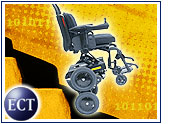
The iBOT mobility system, called the Ferrari of wheelchairs, is now helping disabled users break through physical barriers. The iBOT can climb stairs, bump up curbs, glide through gravel and even elevate a seated passenger to reach the top shelf at a grocery store.
To help get the iBOT out on the market, the Food and Drug Administration expedited the review of the wheelchair. “It can help improve the quality of life of many people who use wheelchairs by enabling them to manage stairs, reach high shelves and hold eye-level conversations,” said FDA Commissioner Mark McClellan.
Independence Technology, the company that makes the iBot, claims to have spent eight years and more than US$150 million dollars to develop its technology and bring it to market. Essentially, the iBOT is a gyro-balanced mobility device designed to operate either on four or two wheels, stabilizing the user by automatically adjusting itself to compensate for any shift in weight.
Operational Patterns
The user can push a button to command the wheelchair to operate in several different ways. The iBOT can easily be converted from a standard chair with four wheels to an elevated chair balanced on only two wheels, which allows the user to reach high objects.
Plus, its four-wheel drive enables the user to travel on rough terrain, move over gravel or sand, go up slopes and climb four-inch curbs. For use on stairs, there are two sets of drive wheels that rotate up and over each other to climb up or down, one step at time. Because of its balancing mechanism, the wheelchair remains stable, and the seat stays level.
But not every one of the estimated 2 million people in the United States who use wheelchairs will be able to buy the iBOT. In addition to its hefty price tag of $29,000, people must weigh no more than 250 pounds and must have the use of at least one arm to operate the chair.
According to the FDA, the user also must have good judgment skill to discern which obstacles, slopes and stairs to avoid to prevent serious falls. Plus, users must be capable of some exertion when climbing stairs in the wheelchair by themselves.
In addition to these restrictions, physicians must undergo special training to prescribe the iBOT. The FDA said the chair must be calibrated to the patient’s weight, and patients have to be trained in its use and pass physical, cognitive and perception tests to prove that they can operate the iBOT safely.
Substantial Resources Required
Ron Enderle, principal analyst at the Enderle Group, said only those with substantial resources will be able to afford the $29,000 price tag. “It is unlikely that many insurance companies will buy this unless the insurance payment is out of some type of liability action,” he told TechNewsWorld.
“It clearly is out of the range of most, if not all, health insurance.”
But for those with substantial resources, the technology behind the iBOT could lead to further technological breakthroughs in the future. “The core technology is one of those that has the potential to revolutionize transportation, but it may take a decade or so,” said Enderle.
He added that the technology at work in the wheelchair might have military or industrial applications at some point in the future. For instance, the technology could be useful as an antiterrorist bomb robot or as another type of autonomous robotic tool.
Basic Functions
The iBOT has several functioning features. The balance function elevates the user to move around at eye level and to reach high places independently. In this function, the front wheels rotate on top of the back wheels while the user remains seated at a higher height.
The stair function enables the user to safely climb up and down stairs, with or without assistance. The four-wheel function enables the user to climb curbs as high as four inches and to travel over grass and gravel, through sand and across other forms of uneven terrain.
In addition to this, the remote function allows the user or an assistant to control the device remotely to drive it into a sport utility vehicle or van for transport. Finally, the standard function lets the user operate the device in the same manner as if in a traditional power chair.
The company has developed multiple computer backup systems to help ensure user safety in all functions. The joystick-operated steering system is proportional and directional, comparable to current joystick-controlled wheelchairs on the market.
Jean-Luc Butel, president of Independence Technology, describes the iBOT as the most thoroughly tested, studied and sophisticated device ever manufactured for the disability community. “It is our hope that the arrival of the iBOT will create greater awareness of the importance of providing equal accessibility to every person with a disability,” said Butel.
It is estimated that approximately 2 million Americans use a wheelchair or scooter type of mobility aid, said Butel. “For people with mobility-related disabilities, the iBOT represents breakthrough technology not available in any other product.”
Like a Ferrari
For those looking for an affordable power wheelchair, the iBOT is considerably more expensive than others on the market, which are sold for prices in the range of $8,000 to $10,000, according to Susan Elder, director of marketing at Invacare, the world’s largest maker of wheelchairs.
“In almost all cases, sophisticated power wheelchairs such as the iBOT or Invacare’s Storm TDX are medically necessary equipment that require a doctor’s prescription and are paid for through Medicare, Medicaid or private insurance,” Elder told TechNewsWorld. “There is a question whether payers will approve the substantial premium cost of the iBOT, especially in the current environment of concern over rising medical equipment costs.”
In addition to the extra cost, Elder said the iBOT has several potential flaws. She pointed out that the iBOT has a wide turning radius and that its motor is rather loud compared with other power wheelchairs. Plus, she said that many of its technological advances, such as balloon tires designed to travel over rough terrain, are designed only for a few select users.
“The iBOT is impressive. But we think it is like a Ferrari,” she said. “It has advanced technology, and some of that technology will no doubt be adopted in the future.”
But it is not a mainstream product, she said. “And only a small number of people will be willing to spend the money to show it off or to have it as their second power chair for specialized use.”





















































I AM thinking about purchasing a ibot wheelchair. An issue has arisen about the ability to lock down the ibot in the drivers space of a van. My understanding from the lock down system maker is that it does not work with the ibot. I AM pursuing the issue with ibot. My question is has anyone who uses an ibot or knows about them had this probem? And if so has anyone worked out any solutions?
Brian,
I just went for my assessment 4 hr program today, after receiving a prescription from my Dr. for the IBOT.
All I can tell you is WOW WOW WOW… what a machine, I ordered mine today, it is beyond anything that your wildest dreams could ever imagine, and I of course AM as well disabled, and it is going to give me the mobility that I have been looking for, with dignity, as it is so versatile, 4 wheel drive, all wheel drive, gyro-scope, up on 2 wheels, balancing like a ballerina….incredible. The best part is that it will fit right into the back of either of our Mini Van or our PT Cruiser, it will NOT require me to have a Custom made Van conversion, with some huge ramp and feeling even more disabled than I already AM . Depending on where you are, you should see about getting a prescription from your Dr. for an assessment, and then go for that, and then see if your Insurance or Medicare will cover it. It is VERY expensive, but worth every penny that is for sure.
I will have mine ready in the beginning of January, and then have to go for 2 more days of training when I pick it up.
Where are you located ??
Warmest Holiday Wishes.
Jan…
This is an exciting mobility system!! Being eye level with your family again, going through the sand on the beach to be able to splash in 4" of ocean water..What about being able to "climb" up a flight of stairs!! The "abilities" of this mobility system far out weigh the price tag!
This a question for Jan who stated that she ordered an IBot. Jan would you share with us if you obtained any financial assistance and from whom. insurance, Medicare, VA or others? My name is Ron and I live in San Diego. I AM a post polio.
I AM looking for Ibot owners who have taken their chairs on airplanes.What kinds of issues did you encounter…damage,handling issues…FEAR for your Ibot????I have just ordered my IBot and cannot wait to go for my final test and delivery.
You mention that the ibot can go in 4 inches of water. Is this true? I haven’t read anywhere about this.
The main criticism seems to be (though is not lmited to) the high cost. Has anyone got one or tried one yet? Any impressions would be of great interest as I AM disabled.